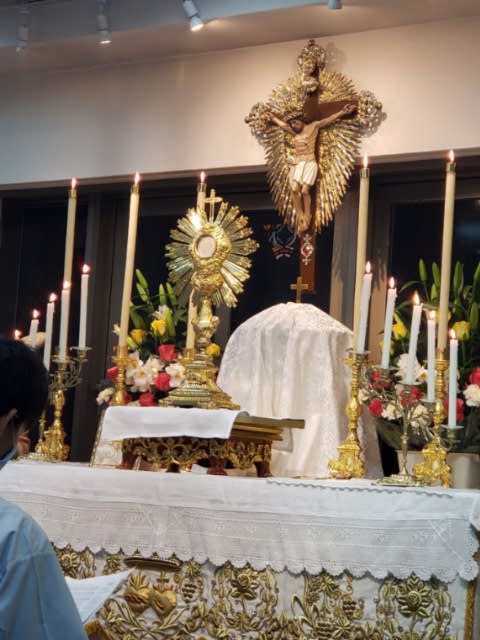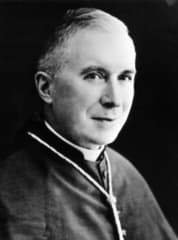テニエール神父著『聖体の黙想』 (1953年) (Révérend Père Albert Tesnière (1847-1909))より【アルベール・テニエール神父は、聖ピエール・ジュリアン・エマールの創立した聖体修道会の司祭で、聖体修道会の総長(1887-1893)も務めた。】
聖体の制定された理由
聖体は主の聖徳の模範の継続である
礼拝 人としても祭壇上にまことに生きたもう私たちの主イエズス・キリストを礼拝し、謹んで主の御言葉を聞こう。『われは世の光なり。われに従う者は暗やみを歩まず』『われは道なり、真理なり、生命なり』『われは心柔和けんそんなるがゆえにわれに学べ』『われなんじらに例を示したるは、わがなんじらに為ししごとく、なんじらにも為さしめんためなり』と。
救い主はこれらの御言葉によって、私たちに与えてくださる最も大きな御恵みのひとつ、また地上での最も大きなご使命のひとつは、示されたご模範であることを教えてくださったのである。それまでの人間は自然徳についてもたびたび誤謬に陥り、超自然徳については全く知るところがなかった。だから、もしも『天主の聖なるもの』救い主キリストがみ教えと御行ないとによって、真理と完徳の模範を示してくださらなかったならば、世はまだ死の暗黒に坐して、腐敗の道をたどりつづけていたであろう。
人となりたもうた御言葉によって示されたご模範の中に含まれる聖徳の教えは、実に無限の御恵みである。主は天主の愛と他人への愛と、また貞潔、けんそん、忍耐、従順などの諸徳とを世に教えてくださり、その際ご自分からこれらの諸徳を実践して、その愛好すべきさまを示し、私たちの怠惰心を励まされた。主はさらに主の愛によって行われるすべての善業の報いは、天国での主ご自身の所有であることを私たちに約束された。これによって人々はこのような言語に絶する大いなる賞与をめざし、どんな艱難(かんなん)ぎせいにも堪え、英雄的な聖徳をさえ実現しようと奮起するようになったのである。
聖体は世々に至るまで、人となりたもうた御言葉の地上的なご生涯を継続する。イエズスが聖体の外観のもとで実行される諸徳、いわば聖体の状態におとどまりになるための条件ともいう諸徳の輝きをながめたてまつるには、聖体を仰ぎ望み、信仰をもって黙想すれば、それで足りるのである。
卑しいパンの状態で貧しい聖櫃の中におとどまりになったのは、いかなる御方であろうか。これこそ全能の天主であり、同時に人なる尊い救い主にほかならない。それならば、それはなんという謙そんであり、なんという貧しさであろう。
司祭の奉献の言葉に服従されるのは、いかなる御方であろうか。聖体拝領者の祈りに答えてご自身をお与えになるのは、どんな御方であろうか。天地の支配者であり、万物の創造主ではないだろうか。であるならば、それはなんという従順、なんという完全な服従であろうか。
日々、聖体に加えられる不敬、侮辱、冒瀆(ぼうとく)に対してさえ、これを黙しお忍びになるのはいかなる御方であろうか。御稜威尊き天主、天使さえも恐れおののいてお仕え申しあげる全能の天主ではないだろうか。ではそれは、いかなる忍耐であろう。
最後に、あらゆる人々に、いつまでも常に聖体と恩恵とを与えてくださるのは、どんな御方であろうか。なんぴとにも何ものにも負うところのない天主、地上での御務めをことごとく果たされた救い主ではないだろうか。にもかかわらず主はまだなんらのみわざを営みたまわなかったように、聖体の中で、御恵みに御恵みをお重ねになるのである。ああなんという御慈悲であろう。
実に聖体の秘跡は、かねて主が地上で人々にお与えになったみ教えとご模範とを、このように世の終わりまで継続されるのである。
だから礼拝しよう。秘跡の中においでになるイエズスを。聖体が聖徳そのものなる救い主に在(ましま)すことを黙想し、聖体の信心に関する最も重要な右の真理をよく会得しよう。
感謝 この真理を黙想するとき、あなたは主の感ずべき謙そんとご慈悲とに対して、無感覚ではおられないであろう。聖徳を理解するには、聖徳の生きた教えがぜひ必要である。そしてこのために主が地上的ご生活を秘跡によって今に至るまで継続し、すべての人々に完徳の鑑(かがみ)をお示しになるのは、まことにきわまりない御恵みといわなければならない。私たちは福音書によって、主の言行を知ることができる。しかし私たちの目前で、主の聖徳の模範が引きつづいて行われるのを見るとき、私たちはさらにいっそうの感激をおぼえるのである。しかもこの時における主のご模範は非常に顕著であるから、無知で単純な心の持ち主でも容易にみ教えの意味をさとることができる。聖櫃の貧しさ。ホスチアの卑しさ。忘れられ、辱められ、侮られたもうたにもかかわらず、常にお守りになる沈黙と忍耐、友と仇(あだ)との区別なく、すべての人々に御身をお与えになるご寛仁。すべてこれらは、誰にも見え、誰にもわかる事実であって、これを了解するには、聖体のおおいの下においでになる御者が、天主にして人なるイエズス・キリストであるという公教要理の初歩の信仰をもつならば十分である。主が貧困、忍耐、謙そん、犠牲などをよぎなくされる聖体の状態にあることを承諾されたのは、明らかに主がすすんでこれをお選びになったからではないだろうか。だからこれらは、主が私たちのための模範として聖体の中で実行される御徳であるに相違ない。
しかもあわれみ深い主は、聖体の中で、このような貴重な模範をお示しになっただけではなく、私たちの力を養うために聖体そのものを与えられる。すなわち、聖体拝領に際し、万徳の主は私たちの霊魂の中におくだりになり、私たちと一致し、その全能をもって私たちを助けて徳を行なわさせてくださる。一方、この聖体拝領は、私たちが望めば毎日でも可能であり、主はその尊い模範を示されるとともに、徳の実行に必要な恩恵を絶えず私たちに与えてくださるのである。
ああ恵み豊かな天主の富の偉大さ、なんぴとがこれを知り尽くし、これにふさわしく主を賛美することができるであろうか。
償い これに関した償いは、二つの理由から必要である。第一に、主は無限の御あわれみをもって善徳の模範を私たちの目前に示し、私たちの霊魂を助けてくださるのに、私たちは平然として罪悪、怠惰、卑怯な生活を送っている。私たちのこのような状態は、いかにも卑しく、また醜く、厳罰に価するものではないだろうか。主は恩恵を与え、模範をたれ、決して倦(う)みたまわないのに、どうして私たちは惰眠をむさぼっているのだろうか。これはいかに恥ずべきことであろう。私たちがいかにへりくだってもそれで十分ということはできないだろう。
償いの第二の理由は、聖体のお示しになるご模範に信者が多くの注意をはらわない事実である。実際、ほとんどすべての信者が、主ご自身の誉れと栄えとを犠牲にして、私たちにお与えになるこの宝をおろそかにしている。主の御知恵とご慈愛との最大の傑作がこのように無視され、侮られているのは、まことに嘆き悲しむべききわみではないだろうか。私たちは自分のため、並びに人々のためにこれを嘆き『おのが輩(やから)』から忘れられた救い主に心から同情をお寄せしなければならない。
祈願 私たちは自分の生活をもっと聖体に近く、親しいものとする決心をつくり、必要な恩恵を主に請い求めよう。なお聖体を通じてイエズスの聖徳を学び、これをよく理解するために、しばしば聖体のみ前で福音書を黙想し、特に私たちの境遇に適した模範に注意し、これによって、利益を得るために主の御助けを祈ろう。願わくは、聖体の秘跡が、私たちにとって『道であり、真理であり、生命にてまします』ように。
実行 今後、徳について黙想するとき、必ずイエズスがご聖体の中でお示しになるご模範を考え、また修徳のために聖体拝領をよく利用しよう。
II. The Eucharist Continues the Admirable Example given by the Earthly Life of the Incarnate Word
The Reasons of the Eucharist.
II The Eucharist Continues the Admirable Example Given by the Earthly Life of the Incarnate Word.
I. Adoration.
Adore Our Lord Jesus Christ, truly and personally present and living upon the altar, and listen to the consoling words issuing from the depths of the Sacrament: " I am the light of the world; he who follows Me does not walk in darkness." " I am the way, the truth and the life; learn of Me who am meek and humble of heart." "I have given you an example, that as 1 have done so you yourselves may also do."
When Our Saviour said these words, He testified to one of the greatest blessings, one of the most important ends of His mission upon earth. Humanity had perverted the notion of natural virtues and it was totally ignorant of supernatural ones. Without the revelation of Christ, the Saviour, of the "holy One of God," who taught by His words and by His example the real idea and the perfect practice of virtues, the world would have continued to live in darkness, and to walk in the evil paths of moral corruption, soiled with all the infamy of paganism.
The idea of virtue taught by such clear words, and sustained by such encouraging examples as those given by the Incarnate Word, is therefore an immense boon. It is He who taught the world what the love of God is, what love towards our neighbor is; in fine, what are chastity, humility, patience, obedience, and all other virtues. By first practising them, the Saviour rendered them amiable and attractive; He counteracted by His example our repugnance against making any efforts. By rendering Himself the recompense of every act of virtue performed through love of Him, He has given to pur combats in the cause of virtue such magnificent compensations that man has reached the point of joyfully embracing the greatest sacrifices that he may practise it.
The Eucharist perpetuates before the eyes of all generations the virtues of the terrestrial life of the Incarnate Word; it suffices to look at it, to know what faith teaches in regard to the Sacrament, in order to behold, shining in it, the most sublime, the most heroic virtues, those which come forth from the very Eucharistic state itself and seem to be the condition of it.
Who is it that remains in such a state of inertia in a poor tabernacle under such humble appearances?
The all-powerful Man-God, the triumphant king. But, then, what poverty, what humility! Who is it that obeys the words of the consecrating priest; who is it that gives Himself to the prayers of the communicant ?
The King of kings, the sovereign Master! But, then, what ready obedience, what unreserved submission! Who is it that bears in silence the irreverence, the outrages, the sacrileges by which the Sacrament is daily attacked ? The God of majesty, the God whom the angels adore in trembling J But, then, what heroic patience! Who, lastly, is it that gives the Eucharist with all its graces to all, always, and without end? The God that owes nothing to any one, the Saviour who finished His task on earth down to the last iota. But, then, how sublime is His devotedness in the Sacrament! What charity, what forgetfulness of Himself!
Thus, all the virtues are taught and practised by the Saviour in the Eucharist, where He perpetuates in His sacramental life the teaching and the examples given during His human life.
Adore, then, Jesus in the Sacrament, praise Him and contemplate Him as the master of all virtues; penetrate your soul fully with this truth, which is one of the most important in regard to Eucharistic piety.
II. Thanksgiving.
It would not be possible for you to meditate upon this consoling truth without your soul feeling itself to be penetrated with gratitude for the sweet kindness, the touching condescension of Our Lord. For if the teaching of virtues is absolutely necessary in order that we may comprehend them, is it not infinitely kind of Him to perpetuate, in the Sacrament, the virtues of His earthly life, so that all may see them there practised before them in all their perfection? Doubtless it is much to read of them in the Gospel, but is it not more efficacious still to see the practice of them continued in our presence ?
And the examples are so striking that the most simple among us can easily understand them. The poverty of the tabernacles; the fragility of the sacred species; the silence and the patience observed by the Saviour in the Sacrament, where He is forgotten, where injuries are inflicted on Him, or where He is maltreated; the readiness He shows to give Himself to all of us, friends or enemies — all this is visible, accessible, palpable to everyone; it suffices to have the faith of the catechism which teaches that Christ, God and man, is present under the veils of the Sacrament. If He accepts and submits to all the conditions of such a state, poverty, patience, humility, sacrifices, it is evident that He wills them, that He has chosen and adopted them; these conditions are therefore virtues which He practises and of which He gives us the example. Therefore, there is nothing to do, in order to understand it all, but to place ourselves before the Eucharist, and to recall to mind the precept of St. Peter: "Behold and do!"
But His goodness, which places before our eyes such luminous and perpetual examples, does still more: it gives us the Sacrament itself as nourishment, which means that, by the Communion, we receive grace, strength, and the means of practising what is taught us. The Communion gives to the soul power to practise what has been taught us by example. The Master of virtues descends into us, unites Himself to us, practises His virtues with us; He gives us, by His presence in our souls, the power and the facility of virtue, of its sacrifices and of its combats. It is more than example, it is the divine strength infused into the depths of our soul, appropriated to our faculties. And as the Communion is offered to us all the days of our life, in all the situations in which we may be placed, it is therefore in an uninterrupted manner that the Eucharist communicates to us the grace of Christian virtues, even as it is without interruption that it shows us the examples of them.
Oh abundance of the riches of our God, bestowed so lavishly in the Sacrament! Who is able to understand thee sufficiently in order to praise thee worthily ?
III. Reparation.
Two thoughts ought to furnish reparation in regard to this subject. The first is, that the example of the virtues of Jesus continued before our eyes so mercifully, and its succor so abundantly diffused in our souls, render our vices, our sins, our cowardice in doing what is right, our voluntary defects, incomparably more disfiguring, more guilty and more worthy of chastisement. To be what we are, in presence of what He is, and of what by His grace and His example He labors so perseveringly to render us — oh shame! oh horror! oh stupidity! How can we sufficiently despise ourselves ?
The second source of reparation springs from so few Christians thinking of the virtues of Jesus in the Eucharist; nearly all of them neglect the treasure which Jesus offers us at the price of immense sacrifices imposed upon His glory, His honor, and His royalty. It is sad, painful, and lamentable that so great a masterpiece of wisdom and of love should be so ignored and so neglected. We cannot but deplore it for ourselves and for others, and take opportunity from it to compassionate the Saviour, " ignored by those in the midst of whom He lives," and so really too!
IV. Prayer.
Let us ask for grace, and let us make the resolution henceforth to live in nearer and more loving relations with the Eucharist; to study in it the virtues of Jesus; to apply to them, in order the better to understand them, all that the Gospel relates of them; lastly, in the contemplation of the Eucharist, to derive from it examples of the virtues of our state; and on the reception of the communion, the graces and succor necessary to reproduce in us these divine examples. May the Eucharist be to us indeed, "the way, the truth, the life!"
Practice,
Never meditate upon a virtue without studying the way in which Jesus practises it in the Sacrament, and the help holy Communion offers to us for the practice of it.














